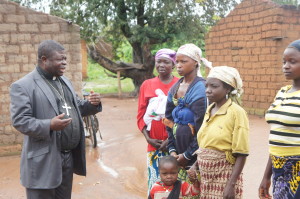Megan Brandsrud

Rev. Goliké, President of the Evangelical Lutheran Church of CAR, discussing with a group of women affected by the crisis in Bohong.
In Bohong and five surrounding villages, attacks have led to the destruction of private properties from 16 to 21 August 2013. The LWF emergency team and UNICEF Rapid Response Mechanism team carried out an assessment in the affected areas and estimated the number of houses burnt down at 1800 and population affected at 16.747.
Bohong is 85 km distance from Bouar where the head office of the ELF member church, the Evangelical Lutheran Church of CAR (ELCCAR), is located.
During an evening in which the now all-too-familiar sound of attacks was moving closer to his home, Rev. André Golike, the president of the Evangelical Lutheran Church of the Central African Republic, his wife and some of his colleagues hid in a closet and underneath a bed while members of a rebel group known as Séléka raided his home. Though the rebels searched the home for an hour, Rev. Golike and the others in hiding were never discovered. “God made them blind,” Rev. Golike says as he recounts the story of how he and his wife and colleagues embraced with tears of joy after the rebels left and they emerged from their hiding spots to find each other unharmed.
For more than a year, the Central African Republic (CAR) has been ravaged with violence. Half of the country’s 4.6 million people have been impacted by the violence, and more than 530,000 people are displaced within CAR. The violence began in March 2013 when an occupied rebel group known as Séléka overthrew the government. An alliance known as the anti-Balaka formed in response to the Séléka rebel group and has also played a large role in the violence.
Though the Séléka rebel group is a largely Muslim alliance and the anti-Balaka a largely Christian alliance, Rev. Golike makes it clear that the conflict is not one of religious constraint, even though it is often being described that way in media.
“The Séléka group is really more of an occupied rebel group, since most of the members are from Chad and Sudan. They don’t even speak our language,” Rev. Golike said. “The anti-Balaka is made up of Catholics, Muslims and Protestants from [CAR] who came together to try to join forces against Séléka. Muslims and Christians have lived side-by-side peacefully in our country for years; this conflict is not a religious war.”
Rev. André Golike is leading a group known as the Committee for Reconciliation and Peace—a committee of religious leaders in CAR that is promoting and working toward exactly what its title suggests. Rather than fleeing and living in the bush as many have done and continue to do, Rev. Golike and other members of the Committee meet with people who have experienced violent attacks to show compassion and pray for their pain to be lessened.
The Committee is composed of people from several different towns and villages so that the people with whom they visit feel comfortable talking openly with them because there is familiarity and trust present.
“It is not an easy task, but it is an important one—and it is one we will continue,” Rev. Golike said.
On a recent trip to the United States, Rev. Golike said he was moved to witness the empathy of churches in the U.S.
“The people I met [in the United States] really feel what we are feeling at home,” he said. “We are one family; we are one body. Prayer allows us to support each other as brothers and sisters from all around the world.”
Rev. Golike cautions people to not jump to conclusions about the conflict based on what they are learning from media, and he encourages people to advocate and bring more awareness of what is happening in CAR. “Most of the violence that is happening now is just reaction. An attack occurs by one group and the other reacts. It is a cycle that needs to end,” he says. “If we give voice to this, we are stronger than those who are hiding themselves behind this crisis. We need to denounce the violence that is happening.”
Lutheran Disaster Response has been working with the Evangelical Lutheran Church in the Central African Republic to provide assistance to those who are being impacted by the ongoing conflict by helping with food, seed and clothing distributions. If you would like to support Lutheran Disaster Response’s work in the Central African Republic, please visit theLutheran Disaster Response giving page.
Join us in our continued prayer for peace in CAR.
